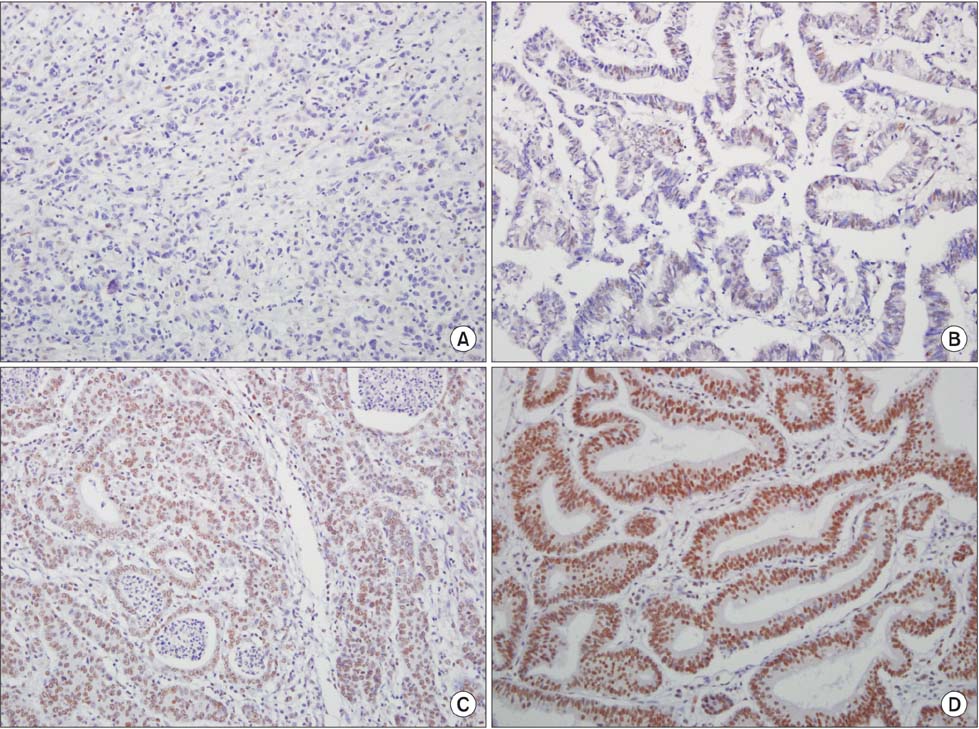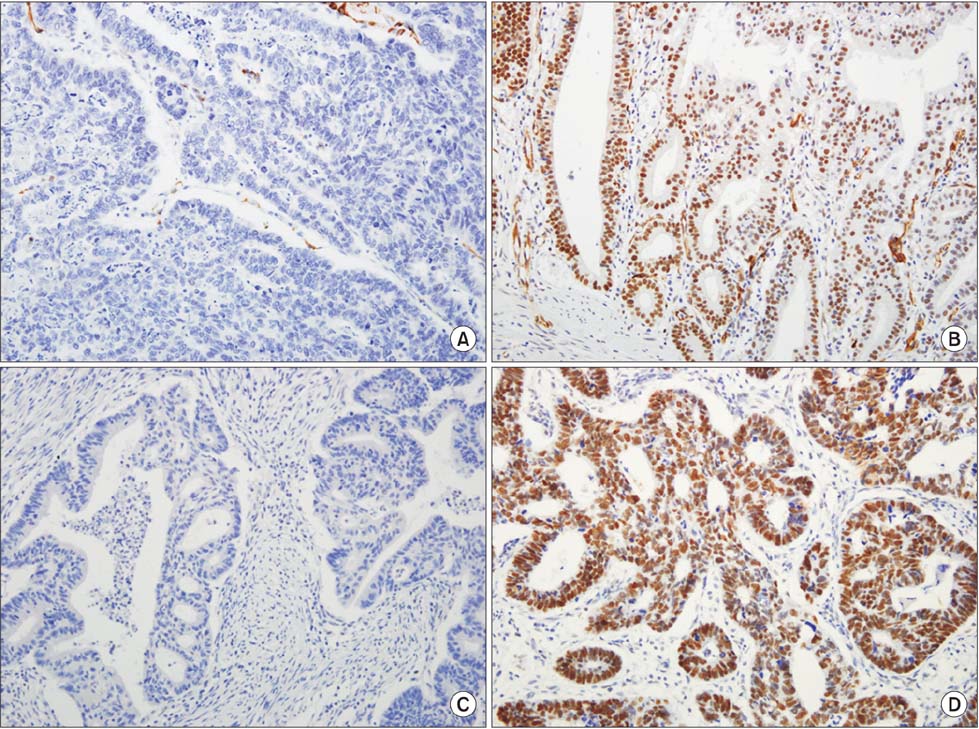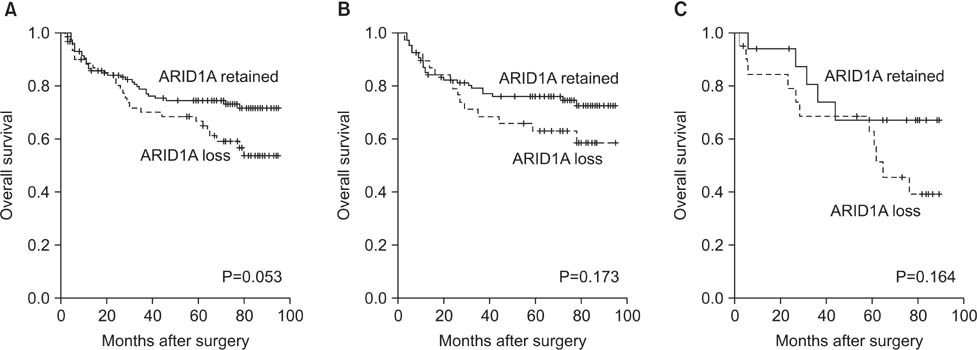J Gastric Cancer.
2015 Sep;15(3):201-208. 10.5230/jgc.2015.15.3.201.
Loss of ARID1A Expression in Gastric Cancer: Correlation with Mismatch Repair Deficiency and Clinicopathologic Features
- Affiliations
-
- 1Department of Pathology, Soonchunhyang University Cheonan Hospital, Cheonan, Korea.
- 2Department of Pathology, Soonchunhyang University College of Medicine, Cheonan, Korea.
- 3Department of General Surgery, Soonchunhyang University Cheonan Hospital, Cheonan, Korea. msslee@schmc.ac.kr
- KMID: 2372206
- DOI: http://doi.org/10.5230/jgc.2015.15.3.201
Abstract
- PURPOSE
The AT-rich interactive domain 1A (ARID1A) gene encodes BRG1-associated factor 250a, a component of the SWItch/Sucrose NonFermentable chromatin remodeling complex, which is considered a tumor suppressor in many tumors. We aimed to investigate the prognostic significance of ARID1A expression in gastric cancers and explore its relationship with clinicopathologic parameters such as mismatch repair protein expression.
MATERIALS AND METHODS
Four tissue microarrays were constructed from 191 resected specimens obtained at Soonchunhyang University Cheonan Hospital from 2006 to 2008. Nuclear expression of ARID1A was semiquantitatively assessed and binarized into retained and lost expression.
RESULTS
Loss of ARID1A expression was observed in 62 cases (32.5%). This was associated with more frequent vascular invasion (P=0.019) and location in the upper third of the stomach (P=0.001), and trended toward more poorly differentiated subtypes (P=0.054). ARID1A loss was significantly associated with the mismatch repair-deficient phenotype (P=0.003). ARID1A loss showed a statistically significant correlation with loss of MLH1 (P=0.001) but not MSH2 expression (P=1.000). Kaplan-Meier survival analysis showed no statistically significant difference in overall survival; however, patients with retained ARID1A expression tended to have better overall survival than those with loss of ARID1A expression (P=0.053). In both mismatch repair-deficient and mismatch repair-proficient groups, survival analysis showed no differences related to ARID1A expression status.
CONCLUSIONS
Our results demonstrated that loss of ARID1A expression is closely associated with the mismatch repair-deficient phenotype, especially in sporadic microsatellite instability-high gastric cancers.
MeSH Terms
Figure
Reference
-
1. Jemal A, Bray F, Center MM, Ferlay J, Ward E, Forman D. Global cancer statistics. CA Cancer J Clin. 2011; 61:69–90.2. Choi YY, Bae JM, An JY, Kwon IG, Cho I, Shin HB, et al. Is microsatellite instability a prognostic marker in gastric cancer? A systematic review with meta-analysis. J Surg Oncol. 2014; 110:129–135.3. Velho S, Fernandes MS, Leite M, Figueiredo C, Seruca R. Causes and consequences of microsatellite instability in gastric carcinogenesis. World J Gastroenterol. 2014; 20:16433–16442.4. Wu RC, Wang TL, Shih IeM. The emerging roles of ARID1A in tumor suppression. Cancer Biol Ther. 2014; 15:655–664.5. Jones S, Li M, Parsons DW, Zhang X, Wesseling J, Kristel P, et al. Somatic mutations in the chromatin remodeling gene ARID1A occur in several tumor types. Hum Mutat. 2012; 33:100–103.6. Wiegand KC, Shah SP, Al-Agha OM, Zhao Y, Tse K, Zeng T, et al. ARID1A mutations in endometriosis-associated ovarian carcinomas. N Engl J Med. 2010; 363:1532–1543.7. Park JH, Lee C, Suh JH, Chae JY, Kim HW, Moon KC. Decreased ARID1A expression correlates with poor prognosis of clear cell renal cell carcinoma. Hum Pathol. 2015; 46:454–460.8. Faraj SF, Chaux A, Gonzalez-Roibon N, Munari E, Ellis C, Driscoll T, et al. ARID1A immunohistochemistry improves outcome prediction in invasive urothelial carcinoma of urinary bladder. Hum Pathol. 2014; 45:2233–2239.9. Zhao J, Liu C, Zhao Z. ARID1A: a potential prognostic factor for breast cancer. Tumour Biol. 2014; 35:4813–4819.10. Ye J, Zhou Y, Weiser MR, Gönen M, Zhang L, Samdani T, et al. Immunohistochemical detection of ARID1A in colorectal carcinoma: loss of staining is associated with sporadic microsatellite unstable tumors with medullary histology and high TNM stage. Hum Pathol. 2014; 45:2430–2436.11. Bosse T, ter Haar NT, Seeber LM, v Diest PJ, Hes FJ, Vasen HF, et al. Loss of ARID1A expression and its relationship with PI3K-Akt pathway alterations, TP53 and microsatellite instability in endometrial cancer. Mod Pathol. 2013; 26:1525–1535.12. Inada R, Sekine S, Taniguchi H, Tsuda H, Katai H, Fujiwara T, et al. ARID1A expression in gastric adenocarcinoma: clinicopathological significance and correlation with DNA mismatch repair status. World J Gastroenterol. 2015; 21:2159–2168.13. Allo G, Bernardini MQ, Wu RC, Shih IM, Kalloger S, Pollett A, et al. ARID1A loss correlates with mismatch repair deficiency and intact p53 expression in high-grade endometrial carcinomas. Mod Pathol. 2014; 27:255–261.14. Wang K, Kan J, Yuen ST, Shi ST, Chu KM, Law S, et al. Exome sequencing identifies frequent mutation of ARID1A in molecular subtypes of gastric cancer. Nat Genet. 2011; 43:1219–1223.15. Cancer Genome Atlas Research Network. Comprehensive molecular characterization of gastric adenocarcinoma. Nature. 2014; 513:202–209.16. Kim KJ, Lee KS, Cho HJ, Kim YH, Yang HK, Kim WH, et al. Prognostic implications of tumor-infiltrating FoxP3+ regulatory T cells and CD8+ cytotoxic T cells in microsatellite-unstable gastric cancers. Hum Pathol. 2014; 45:285–293.17. Abe H, Maeda D, Hino R, Otake Y, Isogai M, Ushiku AS, et al. ARID1A expression loss in gastric cancer: pathway-dependent roles with and without Epstein-Barr virus infection and microsatellite instability. Virchows Arch. 2012; 461:367–377.18. Yan HB, Wang XF, Zhang Q, Tang ZQ, Jiang YH, Fan HZ, et al. Reduced expression of the chromatin remodeling gene ARID1A enhances gastric cancer cell migration and invasion via downregulation of E-cadherin transcription. Carcinogenesis. 2014; 35:867–876.19. Shia J, Ellis NA, Klimstra DS. The utility of immunohistochemical detection of DNA mismatch repair gene proteins. Virchows Arch. 2004; 445:431–441.20. Kim JH, Kang GH. Molecular and prognostic heterogeneity of microsatellite-unstable colorectal cancer. World J Gastroenterol. 2014; 20:4230–4243.21. Han N, Kim MA, Lee HS, Kim WH. Loss of ARID1A expression is related to gastric cancer progression, epstein-barr virus infection, and mismatch repair deficiency. Appl Immunohistochem Mol Morphol. 2015; DOI: 10.1097/PAI.0000000000000199. [In print].22. Zhang X, Sun Q, Shan M, Niu M, Liu T, Xia B, et al. Promoter hypermethylation of ARID1A gene is responsible for its low mRNA expression in many invasive breast cancers. PLoS One. 2013; 8:e53931.23. Wang DD, Chen YB, Pan K, Wang W, Chen SP, Chen JG, et al. Decreased expression of the ARID1A gene is associated with poor prognosis in primary gastric cancer. PLoS One. 2012; 7:e40364.24. Lee SY, Kim DW, Lee HS, Ihn MH, Oh HK, Park do J, et al. Loss of AT-rich interactive domain 1A expression in gastrointestinal malignancies. Oncology. 2015; 88:234–240.
- Full Text Links
- Actions
-
Cited
- CITED
-
- Close
- Share
- Similar articles
-
- Prognostic Significance of ARID1A Expression Patterns Varies with Molecular Subtype in Advanced Gastric Cancer
- Gastric Cancer and DNA Mismatch Repair
- Expression Pattern of DNA Mismatch Repair Genes in Tumors of Microsatellite Mutator Phenotype
- Decreased ARID1A expression is correlated with chemoresistance in epithelial ovarian cancer
- Loss of Tumor Suppressor ARID1A Protein Expression Correlates with Poor Prognosis in Patients with Primary Breast Cancer




